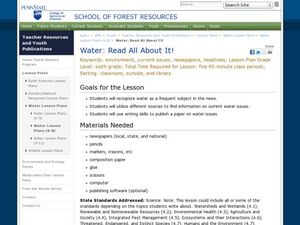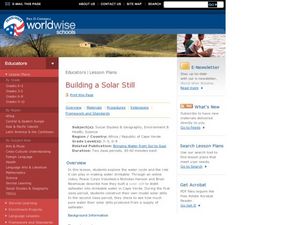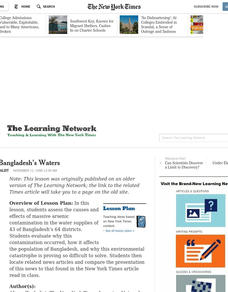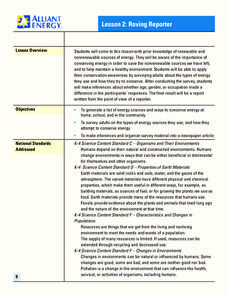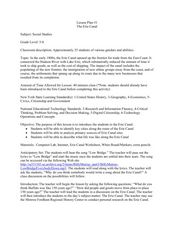Curated OER
Selecting the Tap: Water Safety
Examine water as a scarce natural resource instead of taking it for granted. Middle schoolers identify the traits of potable water, and research local water sources to determine if they are impaired or not.
Curated OER
Unit 1: Water is Life: The Heart and Science Behind this Phrase
Water, water, everywhere — but will there be enough to drink? Check out these detailed lesson plans to meet NGSS water cycle and CCSS literacy standards in your science classroom. Learners do a close reading of a challenging, poetic text...
EngageNY
Gathering Information about Water Management: Assessing and Reading Internet Sources, Day 2
Accuracy, credibility, timeliness ... it's time to act on source reliability! Pupils continue conducting Internet research, selecting two questions about water management from their researcher's notebooks that they want to explore...
EngageNY
Gathering Information about Water Management: Assessing and Reading Internet Sources, Day 3
Water is life! Using the informative resource, scholars first read two informational articles about water management in agriculture. Then, they use a Venn diagram to contrast the different types of evidence authors use to support a...
Curated OER
Water: Read All About It!
Students discuss newspapers and water and work in groups to develop their own paper focusing on water issues. In this journalism lesson, students discuss the value of newspapers and water as an issue. They work as a group to develop a...
EngageNY
Gathering Information about Water Management: Assessing and Reading Internet Sources, Day 1
It takes time to discover what makes a source accurate and credible. Using everything they've learned about source credibility, scholars begin researching supporting questions about how industry and agriculture manage water. They select...
EngageNY
Paraphrasing and Evaluating Sources: Pages 112–116 of The Big Thirst
Agriculture and water—it's a fine balance. So how exactly do industry and agriculture currently manage water? Pupils consider the question as they continue reading excerpts from Charles Fishman's The Big Thirst and adding notes to their...
Curated OER
Building A Solar Still
Students investigate the water cycle by viewing an online video. In this drinking water instructional activity, students create solar stills at their campus in order to purify water that is tainted. Students view a video on their...
Curated OER
Unit 2: Global to Local: Understanding My Place in the Hydrosphere
What does the ground around your home have to do with water pollution? Young ecologists learn about their local watershed and create their own cause-and-effect models of the hydrosphere.
Curated OER
Unit 3: Scientific Writing
Write-on! Demonstrate a writing model and support learners as they write an informational essay on a water resource issue of your (or their) choosing. The lesson plan provides a well-scaffolded summative writing experience that wraps up...
Curated OER
Testing Bangladesh's Waters
Students assess the causes and effects of massive arsenic contamination in the water supplies of 43 of Bangladesh's 64 districts. They evaluate why this contamination occurred, and how it affects the population of Bangladesh.
Curated OER
Ocean Currents
Learners discover the geography of Earth by analyzing water currents. In this oceanography lesson, students create visual references on a map of the globe where and why major ocean currents are moving water. Learners conduct a water...
Curated OER
The Surprise of the Blue Water
Young scholars become aware of factors that effect drinking water quality and how this could effect the health of their school environment. Students compose a business letter reporting their school water quality results to an appropriate...
Curated OER
Alternative Energy Sources
Students recognize that people have various opinions on the use of renewable energy.In this renewable energy lesson, students research to find the best uses of renewable energy. Students create an original design for a group...
Curated OER
The Day the Water Ran Out
Learners explore ecosystems by researching desert characteristics. In this drought lesson, students identify the potential impacts of a drought on their home state and interview people who are familiar with water studies. Learners...
Curated OER
Generating Power
Learners construct a working model of a turbine and explain how water generates power. By the end of the lesson, they list the effects of Kingsley Dam on people, plans, and animals -- both positive and negative.
Curated OER
Roving Reporter
Students write a report about energy use. In this conservation instructional activity, students interview adults about their use of renewable and nonrenewable energy. Students synthesize this information and write a report from the point...
Curated OER
Philadelphia's Important Contribution to the Lewis and Clark Expedition
Students analyze a primary source document (Jefferson's secret letter to Congress) and identify its objectives through the aid of focus questions. They complete a graphic organizer and write an article summarizing Philadelphia's...
Curated OER
The Eerie Canal
Students discover bodies of water in the United States by investigating the Eerie Canal. For this U.S. Geography lesson, students discuss Lake Eerie and the canal that was built in order to transport goods. Students research the lake...
Edgate
Discovering New Resources
What is a natural resource, and what resources did the Lewis and Clark expedition seek? After reading an article on the mapping of the west, learners get into small groups to discuss the important natural resources of the period. They...
Curated OER
Let's Go Exploring!
Use a Courbet painting of a cave or tunnel opening to reinforce the importance of descriptive writing. Writers of all ages use sensory details to describe what the scene depicts as they pretend to be in the painting. Then they imagine...
Curated OER
Analyzing Two or More Nonfiction Texts
How does recognizing the author's purpose help you draw conclusions about a topic? Using two articles (both are attached), learners brainstorm why each author wrote each article. Are their purposes similar or different? Learners use a...
Curated OER
Things That Make Britain Great
Take a trip to Great Britain with this fun reading lesson! Young learners read an article about many famous attributes of Britain - 101 of them, to be exact - and finish several comprehension and grammar activities about what they have...
Curated OER
Webquest: Eradicating Guinea Worm Disease in Ghana
Students examine the impact of Guinea Worm Disease. For this world issues lesson, students take on the roles of Peace Corps Volunteers. Students will apply their knowledge of the Guinea worm life cycle to create a plan for eradicating...
Other popular searches
- Sources of Water Pollution
- Water Sources Grades K 2
- Water Sources K 2
- Activities on Water Sources
- Natural Water Sources
- Water Sources in Qatar
- Types of Water Sources
- Landforms Water Sources
- Sources of Water
- Streams as Water Sources
- Natural Sources of Water
- Water Sources in Drought






